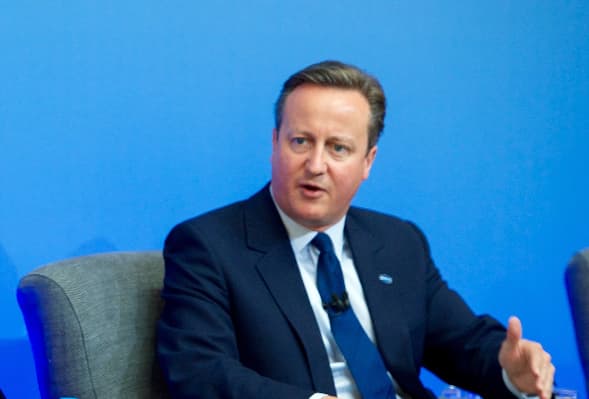Johnson Outflanked by David Cameron in Post-Brexit Tax Debate
In a rare public intervention, David Cameron, a former prime minister, raised concerns about Prime Minister Johnson’s plan to raise National Insurance taxes amidst record inflation and uncertainty over energy. Not to mention the war in Ukraine.

A disagreement has erupted between two Brexit antagonists in the debate over British economic policy. Both are Conservatives and, more curious still, both can boast of residency at 10 Downing Street.
In a rare public intervention, David Cameron, a former prime minister, raised concerns about Prime Minister Johnson’s plan to raise National Insurance taxes in April. This tax hike comes amidst record inflation and uncertainty over energy. Not to mention the war in Ukraine.
“If you can keep the cost of government down and people’s taxes down, you help them through the cost of living crisis, that’s important,” is the way Mr. Cameron’s demarche was recorded in the London Sun.
Cynics may conclude that if a centrist “liberal conservative” like Mr. Cameron is against raising taxes, then perhaps there is something to be said for them, after all. Having the generation that enjoyed the spurious benefits of government largesse pay for their perks, is part-and-parcel of conservative principle. Right?
Conservatives continually lament that it is future generations that will be saddled with their parents’ (and grandparents’) debts. Yet Mr. Cameron has a point. Taxes do not encourage market activity, for either buyer or seller.
And when taxes become too high, they become prohibitive to economic growth. As Calvin Coolidge’s treasury secretary, Andrew Mellon, wrote, “high rates of taxation do not necessarily mean large revenues to the Government, and that more revenue may often be obtained by lower rates.”
This is more than economic optimism. It is borne out by experience, as economist Thomas Sowell demonstrates in his primer on taxes, where tax revenues speak for themselves. In 1921, with a tax rate of 73 percent on incomes over $100,000, tax receipts were little more than $700 million. With the top rate reduced to 24 percent by the end of the decade, revenues were over $1 billion. Raising taxes now would be diametrically opposed to the economic recovery that Britain needs.
High taxes discourage entrepreneurial incentive and economic growth, the twin pillars for employment and prosperity. As Mr. Sowell’s data demonstrate, high taxes on wealth creators depress the government balance sheet. Furthermore, his figures show that at the marginal tax rate of 73 percent, those earning incomes in excess of $100,000 contributed 30 percent of tax revenues; at the lower rate of 24 percent, their contribution rose to 65 percent of total revenues.
So much for “soak the rich” rhetoric, motivated by envy and deaf to sound economic reasoning. And this is no time for emotivism to outstrip economic sensibility. The latest data from the Office for National Statistics are sobering. At the end of March 2021, U.K. debt stood at £2,223.0 billion, comprising 103.7 percent of GDP. Its Westminster deficit, meanwhile, was £327.6 billion (or 15.3 percent of GDP).
Were the Conservative government truly courageous, it would focus on cutting wasteful programs and reducing the burdens of the state — such as Britain’s own scheme to “Build Back Better.” On “Carbon Net Zero” alone, for instance, one estimate sets the “net cost of the UK reaching net zero by 2050 to be £321bn.” Already, Britons are seeing their energy bills rise by 54 percent and climbing, with 25.5 percent of their electricity bills comprising a “green tax.”
Furthermore, raising taxes under cover of fiscal probity is a feint. Conservatives can boast they are being responsible, ignoring the indisputable evidence of tax receipts. Meanwhile, the Labor opposition will support it as “social justice.”
Yet does anyone really believe that government revenue will be targeted toward balancing the budget and paying down Britain’s bills? And not for more outlays on whatever special interest the government of the day wishes to placate?
When the United Kingdom exited the European Union at the end of January 2020, we hoped to see a return to the “roaring twenties.” As T.S. Eliot wrote, “between the idea and the reality falls the shadow.” It’s hard to see how Mr. Johnson can redeem the Brexit promise — and himself — without a fidelity to low taxes and limited government.
BrexitDiarist@gmail.com

